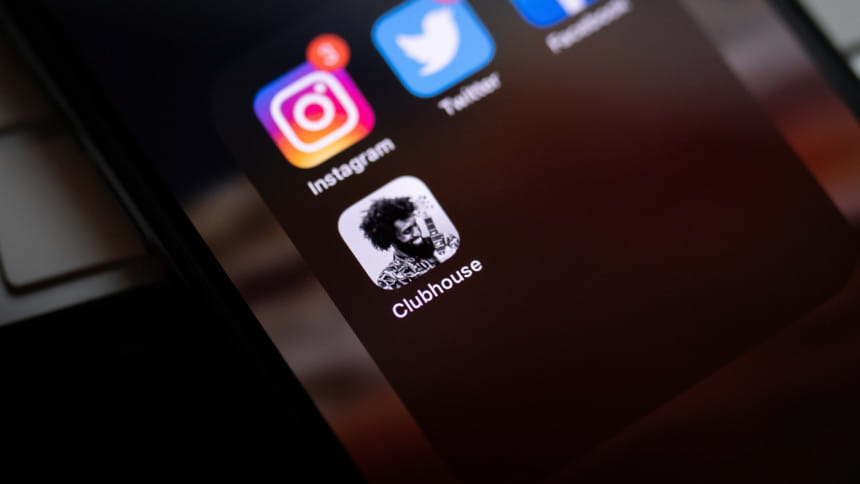Clubhouse: The platform that wants to transform social media, explained

Launched in April 2020, Clubhouse has speedily made its mark in the social media realm as an innovative platform to engage its audience. As the raging Covid-19 pandemic prevented human connection, people built an appetite for unique ways to communicate and interact. Clubhouse made its mark in people's lives by being an audio-only platform.
Gone was the pressure to maintain an aesthetically pleasing Instagram grid or to write an effective tweet in 280 characters or less. Instead, Clubhouse users get to join 'clubs' and 'rooms' where they can hear people speak on specific topics, and potentially speak and engage with others as well.
What effectively marketed Clubhouse as an appealing social media app was the fact that celebrities used this app and gave the chance to ordinary people to possibly interact with them directly. Clubhouse gained popularity when Elon Musk joined the platform and participated in a room which eventually led to a discussion between him and the CEO of Robinhood, Vlad Tenev.
Since then, it has been speculated that this was an immense PR strategy executed by Venture Capitalist firm Andreessen Horowitz which, not only is an investor for Clubhouse and Robinhood, but is also said to support startups that work with Elon Musk's companies. Regardless of whether this was a carefully orchestrated event, it stood to successfully launch Clubhouse into mainstream attention.
Another element that added to Clubhouse's appeal is its exclusivity. Unlike Facebook, Twitter and Instagram, Clubhouse is not free to be joined by anyone and everyone: you have to be specifically invited by someone you know who is already registered on the app.
Inherently, this presents Clubhouse as an elitist platform, especially given the fact that each user gets only two invites to dispense when they join. However, a few weeks into using the app, a user will most likely be given three to four more invites, though this seems to be done in a purely arbitrary manner.
The scenario painted is not unlike that of a crowd of people restlessly waiting outside a high-walled and gated community armed with the knowledge that whatever exists inside is to be coveted. Once let in, however, the sights that meet the eye can be underwhelming. This was the experience of one user, Shovon Ahmed, who said, "Clubhouse was hyped up to be so much when I was not on it. Now that I'm registered, I am not impressed."
Clubhouse representatives assert that the app is merely in its beta phase and that soon it will be available to everyone. Nevertheless, the current situation begs to ask the question: if the allegedly temporary exclusivity is working so well for the platform, will they have enough of an incentive to make it more accessible? Many people have contrasted Clubhouse to the likes of Twitter saying that where on the latter, content regulation is virtually impossible and misinformation and hate-speech can spread like wildfire, Clubhouse is a new, healthy take on moderation. Within the rooms, which are like conferences being live audio-streamed, moderators have full control over who they allow speaking.
In the room with Elon Musk, there have been concerns voiced surrounding the lack of opportunity given to journalists to pose questions. While some may be lucky enough to ask a celebrity a question, it is perhaps more likely that the privileged few with pre-existing social connections will stand to gain the most.
Ultimately, Clubhouse can be seen as yet another manifestation of the privileged and rich to maintain their celebrity status quo, while potentially bringing a slightly different form of entertainment to their audience.
On the other hand, there are a variety of topics surrounding which rooms can be hosted where people can engage easily (albeit, only those who have been invited to join the app). Many people have found Clubhouse to be a refreshing change of pace from the usual ways of interacting on social media.
Much like listening to podcasts, one can use the app while doing chores like folding laundry or cooking. All the rooms happen in real-time and cannot be re-listened (unless someone streams it to another platform like Youtube) which is unlike the mindless scrolling that countless people fall prey to as a result of the addictive design of most social media apps.
Instead, on Clubhouse, the user is forced to be present. Many users have found a safe space to discuss common problems or challenges that they faced, for example, growing up in the West as children of immigrant parents or effective practices to maintain emotional health. Something is reassuring about being able to interact with other people, through speaking about a topic that is meaningful to you, especially in today's isolated world.
Given that Clubhouse is still in its early days as a social media platform, much remains to be seen about its impact on society. However, within this short period, the user experience that it has generated and the social context into which it has played itself is interesting, to say the least.
What makes it even more worthy of attention is its relationship or the complete contrast that it poses to the existing social media giants. Clubhouse's policy on censorship and content regulation will be important to keep an eye on, especially until it becomes a platform accessible by all.
After all, over the last decade, the inefficacy and harmfulness of the likes of Facebook and Twitter have heightened. This is also reflected in the recent move by Twitter, where they have launched a similar product called Spaces to compete with Clubhouse, suggesting that this new paradigm shift in social media is probably here to stay. Facebook is also said to be working on something similar to jump on the bandwagon.
While it is safe to say that social media as a whole is not going anywhere anytime soon, it is perhaps high time for us to see a complete change in the way we perceive it and interact with it.

 For all latest news, follow The Daily Star's Google News channel.
For all latest news, follow The Daily Star's Google News channel. 



Comments